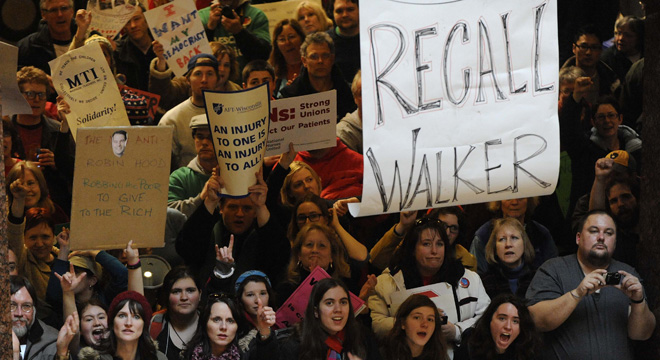Wisconsin Gov. Scott Walker’s administration is rolling out a new strategy to deal with the waves of protests that have fallen upon the state Capitol, ever since he rolled out his anti-public employee union legislation, and which have given rise to the recall campaigns targeting him and other Republicans: Make the protesters pay for all the costs of the increased event security.
As the Milwaukee Journal Sentinel reports, the Walker administration announced the new policy on Thursday, and it will be phased in by Dec. 16. Under the policy, groups of four or more people must request permits at least 72 hours in advance, for events at the state Capitol or other state buildings.
In addition, organizers would have to pay for the extra Capitol police officers, at a rate of $50 per hour per officer — plus costs for police officers brought in from outside agencies, according to the costs billed to the state. The police payment would have to be tendered in advance, as a requirement for getting a permit. Afterwards, organizers would then be charged for any clean-up costs.
The new rules have First Amendment experts asking some questions:
Edward Fallone, an associate professor at Marquette University Law School, said the possibility of charging demonstrators for police costs might be problematic because some groups might not be able to afford to pay.
“I’m a little skeptical about charging people to express their First Amendment opinion,” he said. “You can’t really put a price tag on the First Amendment.”
…
Bob Dreps, a lawyer who handles First Amendment cases including work for the Journal Sentinel, noted that the state can put some restrictions on the “time, place and manner” of free speech. But he said it was “laughable” to define a rally as four or more people.
“They still have to be reasonable on their face,” Dreps said of the rules.
When asked for comment, state Democratic Party spokesman Graeme Zielinski told TPM: “This is more evidence of Scott Walker running Wisconsin like a Banana Republic, with no regard for our traditions or norms. This is an administration obsessed with quashing dissent and demeaning all democratic tools available to citizens who right now are rising up against it. It is un-American.”
Starting this past February, when the legislation was first rolled out, there have been many protests at the Capitol, some of which attracted tens of thousands of people. In some ways, the protests were arguably the true forerunner of the Occupy Wall Street movement.
During the most heated moments, when protesters were staying day and night in the Capitol, police were brought in from around the state to guarantee security — with a reported increase in law enforcement costs of $8 million, for February and March.
This reporter was flown out to Madison for those protests, and can say that things actually went very smoothly, with demonstrators cooperating with police and maintaining some sense of order. Though it was certainly very, very loud, there was also a lack of any violent incidents — an amazing thing, when one considers that there were so many amassed angry people.
At one point, the Walker administration attempted to shut the demonstrations down by going to court, and stating in submitted documents that there had been multi-million dollar damages to the building. However, they quickly backed away from the multi-million claim, when it was found that there had been no professional estimate. However, that number would go on to be touted on Republican talk radio and other venues.
A professional estimate that was done much later, revised the figure way down to $270,000 — and found that for even this, any damage was a matter of the crowds massively accelerating normal processes of wear and tear on the building, rather than any pattern of vandalism: “Essentially the building experienced three to five years of wear within a two-week period.”






